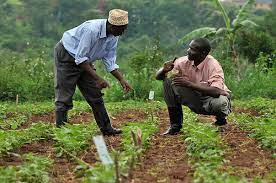Did you know that the dry weather and dust-filled winds of harmattan have a surprising benefit to farmers?
The dry conditions, while difficult, offer advantages that allow crops to grow with fewer pests and more natural protection. With the right tools, knowledge, and government support, farmers in Sokoto state are not just surviving the season—they’re thriving.
In this report, ASHENEWS follows the stories of farmers like Mr. Musa Bachaka and Mr. Haliru Maruda who use creative and resourceful farming techniques to navigate the season’s challenges.
Their success reveal how farmers in Sokoto have learned to work with, rather than against, Harmattan’s conditions.
Crop protection
For a Sokoto-based farmer, Mr. Musa Bachaka who grows a variety of crops, including onions, tomatoes, cassava, potatoes, lettuce, wheat, and Mongolian plants, while the Harmattan season can be harsh, the dust storms and winds keep pests at bay, making it easier to protect crops.
For onions, Mr. Bachaka starts with seeds that grow for about 40 days before transplanting them. He irrigates his fields every 10 days using a pumping machine, which requires significant effort but is essential for crop health.
The benefit of Harmattan, he says, is that the wind helps reduce the number of pests, unlike during the rainy season when infestations can damage his plants.
Though farming during Harmattan requires extra care, like watering every 10 days and using fertilizers, the season’s natural protection from pests makes the effort worthwhile.
A natural fertilizer
On his part, the Director General of the Sokoto Chamber of Commerce, Industries, Mines, and Agriculture, Mr. Haliru Maruda who also practices farming during acknowledges the remarkable benefits of Harmattan for pest control especially, with the hike in fuel prices for running machinery and transporting crops.
“The dry winds act as a natural deterrent for pests,” Mr. Maruda explains. “While the heat in other seasons encourages pests, Harmattan’s winds naturally keep them away, making it easier to grow crops without the same level of damage.”
Overcoming challenges
Both Mr. Bachaka and Mr. Maruda agree on the importance of government support for farming, particularly during the Harmattan season.
They emphasize the need for more targeted assistance, such as loans for purchasing seeds and fertilizers, as well as support with machinery costs. Mr. Maruda even suggested that interest-free loans, in line with religious principles, would better serve the farming community.
Through their insights, these farmers reveal that while the Harmattan season presents challenges, it also offers unique advantages that make it an ideal time for farming.
By leveraging natural factors like dry winds and dust storms, Sokoto’s farmers have found ways to reduce pest damage and increase crop yield, making Harmattan a crucial part of their agricultural strategy.
However, Mr. Maruda points out that accessing quality seeds remains a significant challenge, as poor-quality seeds can severely hinder crop production.
He also urges the government to continue its support for farmers by ensuring that seeds and fertilizers are distributed directly to them.
Similarly, Mr. Bachaka also appreciates the government’s provision of free fertilizers and pest control support, although he advocates for better distribution directly to farmers to ensure it reaches those in need.


